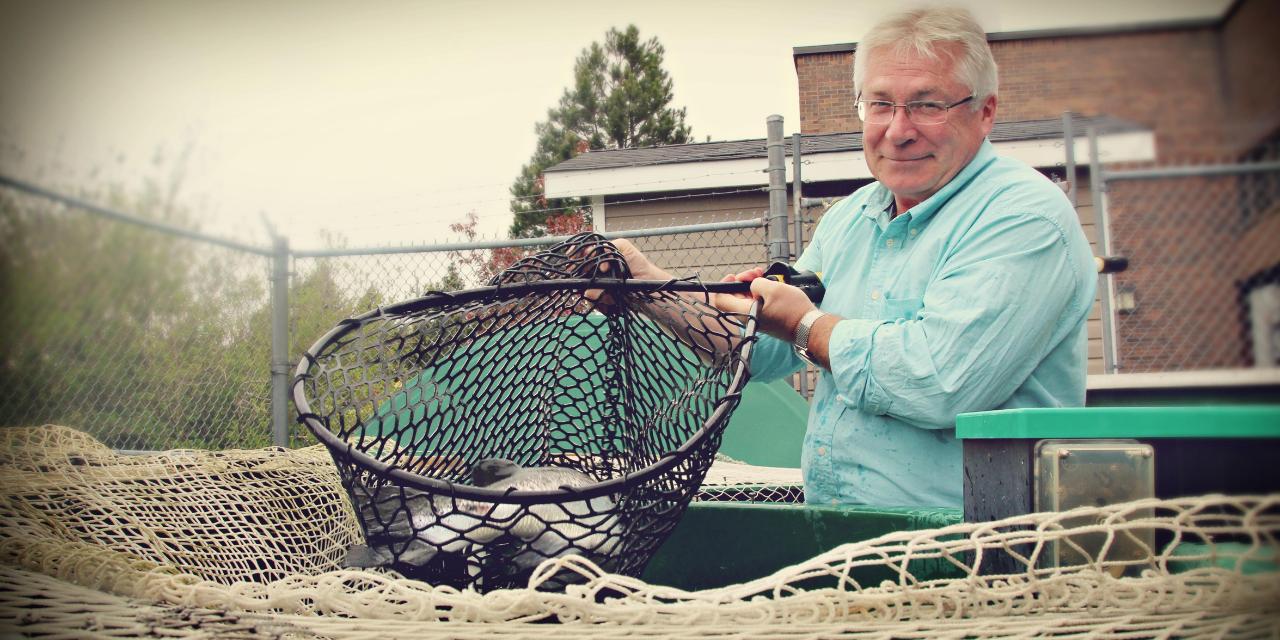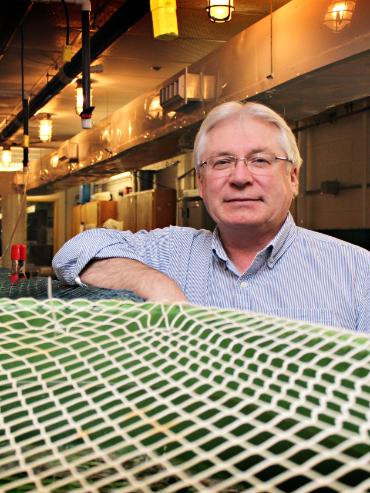The next wave
While the cod fishery remains a vital part of Newfoundland and Labrador culture, it no longer ensures our food security as it once did. And it no longer sustains our rural economies.
Following the cod moratorium of 1992, coastal communities in Newfoundland and Labrador struggled with lost livelihoods and shrinking populations.
In the wake of the cod fishery’s decline, seafood farming emerged as a way for communities to continue their relationship with the sea as a source of prosperity.
The study of aquaculture in the province originated at Memorial University, and today it brings millions of dollars of revenue and employment to towns that were once in dire straits.
But the seafood farming industry has its challenges. There are environmental concerns and the potential for ecosystem disruption and disease outbreaks in the species being farmed.
For well over 40 years, Cyr Couturier has been one of the guiding forces addressing these issues and promoting the value of sustainable aquaculture across the province. He has grounded his work in a respect for both the environment and the people who make their living on the water.
A marine biologist by training, Prof. Couturier studied at the University of New Brunswick and completed graduate work at Dalhousie University. He then settled in at the Marine Institute (MI), becoming an educator and researcher in the lab and on the wharf.

As a research scientist in MI’s School of Fisheries, chair of aquaculture programs at MI and Memorial University, and executive director of the Newfoundland Aquaculture Industry Association, Cyr Couturier has been an advocate for food security and economic development through sustainable aquaculture for over 40 years. Photo by Angie Bishop from the Marine Institute.
In his classes, complex science was transformed into practical field knowledge. Environmental concerns inspired sustainable solutions like selecting the best locations for farms and developing better monitoring tools to keep waters clean.
Former students now working across Canada and around the world often trace their first interest in aquaculture and their sense of environmental responsibility back to Prof. Couturier’s patient explanations and clear-eyed optimism.
He mentored hundreds of students at MI, but he offered his time and knowledge to any student with an interest in the science of aquaculture.
When high-school students from Lewisporte asked for his assistance with a science project, he mentored them to a provincial championship.
When a 13-year-old student from Mount Pearl sought his advice for a science fair, Prof. Couturier went the extra mile. He opened MI’s aquaculture facilities to the young woman, and she went on to a second-place finish in the national Sanofi-Aventis BioTalent Challenge.
Over the years, he mentored hundreds of high-school students as a way of promoting aquaculture to new generations.
His papers influenced research around the world, and his jargon-free, step-by-step guides to proper methods and best practices provided fish farmers with a clear path forward.
His leadership has echoed both nationally and internationally. He’s served as president of the Aquaculture Association of Canada and chair of the Master of Science in Aquaculture Program at Memorial. He’s also chaired boards such as the Canadian Aquaculture Industry Alliance and the Newfoundland Aquaculture Industry Association.
In 2023 he joined the board of the Kurt Grinnell Aquaculture Scholarship Foundation, helping create pathways for Indigenous students in aquaculture.
And he’s contributed to sustainable aquaculture projects to generate economic development and diversification in nearly 20 countries around the world.
In 2025 he was acclaimed chair of the Canadian Agricultural Human Resource Council, a national, non-profit organization addressing the human resource challenges and opportunities facing agriculture across Canada.
His efforts and continuous commitment have not gone unnoticed.
In 2013, he was inducted into the Science Atlantic Hall of Fame for his decades of dedication to aquaculture education and mentorship. In 2014, he received the Lifetime Achievement Award from the Aquaculture Association of Canada. And to celebrate his public advocacy for sustainable aquaculture, he was honoured with the Aquaculture Ambassador Award by the Newfoundland Aquaculture Industry Association in 2022.
He was awarded the King Charles III Coronation Medal in 2025 for exceptional service to his community, province and country.
Decades ago, to support students on their academic journeys, Prof. Couturier established an aquaculture scholarship at MI.
Thirty years later, in 2024, the institute renamed the award the Cyr Couturier Sustainable Aquaculture Scholarship.
His impact is visible in both data and dialogue. Aquaculture is now one of Newfoundland and Labrador’s fastest-growing sectors. It bolsters food security, sustains rural jobs and empowers resilient communities.
Though the industry slowed during the pandemic, seafood farming contributed approximately $280 million to the province’s economy in 2024.
Through his work, Prof. Couturier shows that aquaculture isn’t a shift away from our heritage — it’s the next chapter.
Following his lead and his lessons, communities around the province that once relied on what could be caught can now attend to what can be nurtured — mindfully and sustainably with watchful care.
